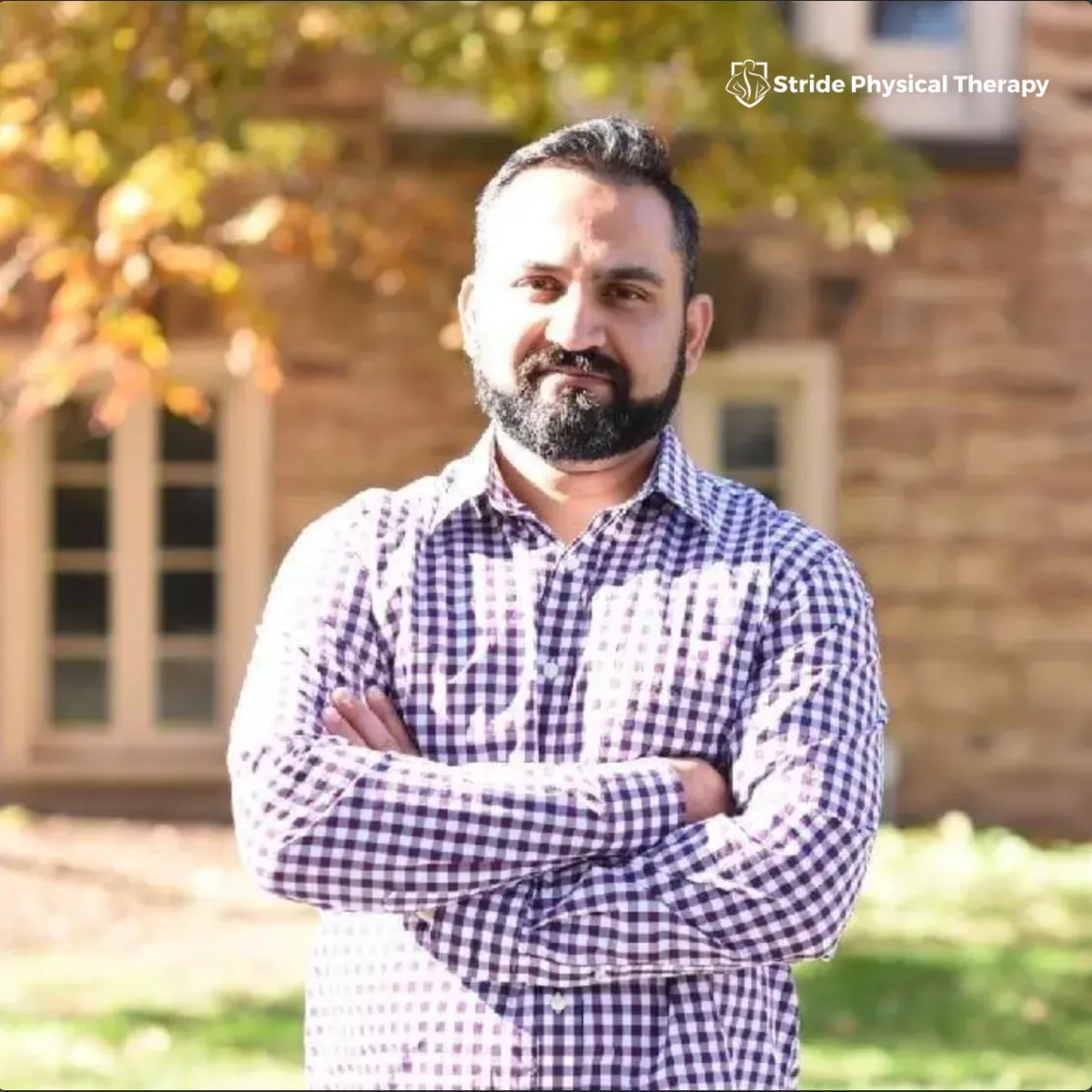Get Back on Your Feet with Foot and Ankle Pain Relief
Your feet work hard every day, and pain in your feet or ankles can seriously affect your daily routines. Simple activities like climbing stairs, walking to work, or driving may become painful tasks. Many things can cause foot and ankle pain, but at Stride Physical Therapy, we're here to help you recover. Physical therapy is effective for healing injuries and easing all types of pain. Book an appointment with our skilled physical therapists in Freehold, NJ, and find out how we can help you feel better!
Why am I experiencing foot and ankle pain?
Your feet and ankles are intricate systems that need to coordinate smoothly to work best. The ankle has three bones that need to move well together, plus connective tissues that keep the joint intact, as the Arthritis Foundation explains.
Your foot is a complex system with about 24 bones, 30 joints, and more than 100 muscles, tendons, and ligaments. Pain in the feet and ankles is very common due to this complexity. A foot or ankle injury can be so painful that you might not bear weight on it, forcing you to hop on the other foot or stay seated and immobile. Even slight pain can limit your daily activities and inconvenience those around you.

Quick Links
FAQs
What condition is causing my foot and ankle pain?
Foot and ankle discomfort might appear out of nowhere from a sudden injury or gradually due to a persistent problem. The Mayo Clinic identifies multiple usual sources of such pain, such as:
Strains and sprains
A strain happens when a muscle or its tendon is overstretched. A sprain happens when a ligament is overstretched or ripped.
Arthritis
Arthritis, a widespread joint inflammation, triggers joint pain. The most often seen forms—osteoarthritis and rheumatoid arthritis—particularly affect the foot and ankle.
Tendinitis
Tendinitis occurs from excessive overuse of the tendons, causing them to become inflamed for a long time.
Bursitis
Bursitis occurs when the Tendinitis results from overworking the tendons too much, leading to prolonged inflammation. rub against the “bursae” or anti-friction sacs, causing them to become irritated and uncomfortable.
Fractures
Broken bones happen when they are hit too hard and either crack or completely snap. If you break a bone in your foot or ankle, you might need to rest for several weeks to heal properly.
Tarsal tunnel syndrome
Tarsal tunnel syndrome happens when the nerve that travels from your ankle to your foot gets compressed and irritated.
Fallen arches
Your foot has various tendons that help create your arch. When these tendons function correctly, they create a normal arch. If they don’t work together well, you may have a low or no arch—known as flat foot—which can lead to pain or discomfort over time.
Plantar fasciitis
Plantar fasciitis is when the tissue connecting your heel to your toes on the foot's underside gets inflamed. Reasons include too much standing, bad standing habits, or wearing shoes without good arch support.
Find foot and ankle pain relief today:
At Stride Physical Therapy in Freehold, NJ, we offer relief for all types of foot and ankle pain. Our expert therapists will carefully assess your condition and craft a tailored treatment plan to target your unique needs.
Your treatment plan combines hands-on therapy, targeted exercises, and stretches to enhance joint movement, balance, and strengthen foot and ankle muscles. We may use a balance and other specialized methods. At Stride Physical Therapy, we aim to relieve your pain swiftly and improve blood flow. We’ll assess and suggest lifestyle adjustments or orthotic shoes to avoid future issues.
Struggling with foot or ankle pain? Take control of your movement and comfort at our Freehold, NJ clinic. Stride Physical Therapy will get you moving pain-free again. Book your appointment now and step towards recovery!
MEET YOUR RECOVERY TEAM

Kanwal Bhardwaj
PT, M.Sc.PT, CIMT, CMNT
Meet Kanwal Bhardwaj, PT, M.Sc.PT, CIMT, CMNT, the driving force behind Stride Physical Therapy in Freehold, NJ. With over 20 years of dedicated experience in the field, Kanwal brings a wealth of expertise and a passion for holistic healing to his practice. Kanwal's journey began with a Master of Science in Orthopedic Physical Therapy from Quinnipiac University in 2004. Over the years, he honed his skills and gained invaluable insights during 18 years of service in outpatient physical therapy offices. In 2014, fueled by a desire to deepen his understanding of patient care, he pursued a manual therapy certification (CIMT). This transformative experience allowed him to adopt a whole-body perspective, focusing on treating the root cause rather than just the symptoms...
At Stride Physical Therapy, we're dedicated to transforming lives. With a focus on the root cause of your condition, we're here to help you regain mobility and embrace an active lifestyle. What sets us apart? Our genuine passion for what we do. Let's stride towards a brighter tomorrow together.
Elevate Your Health with Our All-Inclusive Wellness Services!
Take one step closer to a pain-free life with Stride Physical Therapy! Discover medication and surgery-free solutions with our sessions.
Health Blog

A Physical Therapist’s Perspective on Chronic Back Pain
At Stride Physical Therapy, we see a lot of chronic low back pain and it’s something we know how to handle. Understanding what causes this pain and how you can prevent it is important to us, so we always make sure our patients and their families are well-informed. Remember, having chronic back pain doesn’t mean you have to accept it as a normal part of getting older. You can still experience less pain and enjoy improved mobility, regardless of how long your back has been bothering you. Book an appointment with Stride Physical Therapy to get a personalized consultation. Keep reading to uncover five key insights our physical therapy team has learned about chronic back pain.
1. Most People Will Experience Back Pain at Least Once
Research shows that the majority of people (up to 80%) will have at least one episode of back pain in their lifetime. While not everyone will suffer from long-lasting pain, many cases resolve within a few weeks without special medical care. However, underlying issues like inflexibility or poor body mechanics can persist, increasing the likelihood of recurring pain and injury. Consulting with a physical therapist early can help uncover and address these hidden factors, reducing the risk of conditions like muscle strains, joint misalignments, degenerative disc disease, disc herniation, and nerve impingement.
2. Most Risk Factors for Chronic Back Pain Are Preventable
Many back pain risk factors are preventable. This means reducing your risk of chronic pain and alleviating symptoms is largely within your control. Common preventable risk factors include:
Sedentary lifestyle
Excessive weight
Smoking
Poor posture
Physically demanding jobs that require frequent sitting, bending, twisting, heavy lifting, or exposure to vibration
Stress, anxiety, and depression
At Stride Physical Therapy, we take a holistic approach to treatment, addressing both physical and psychological factors to help you achieve long-term relief.
3. Exercise Often Improves Chronic Back Pain
Moving around with chronic back pain can be challenging, but participating in daily movement is crucial for pain management. Exercise keeps muscles and tissues strong, boosts circulation, reduces chronic inflammation, enhances mood, relieves stress, and helps maintain a healthy body weight. Activities like walking, cycling, and specific exercises to improve tissue healing, strength, flexibility, and endurance are proven effective. A physical therapist can help you develop a safe, effective, and enjoyable exercise program tailored to your needs and goals.
4. Surgery and Long-Term Medications Aren’t Always Necessary
Contrary to popular belief, conditions like herniated discs don’t always require surgery. Invasive procedures like spinal fusions are usually not the first option for chronic back pain. Research indicates that only about half of first-time back surgeries alleviate symptoms, and repeat surgeries have even lower success rates. Surgery also carries risks such as prolonged recovery time and post-operative complications.
Physical therapy is recognized as a first-line treatment for chronic back pain, often reducing the dependency on opioid medications. This makes physical therapy a safer, more cost-effective option.
5. Chronic Back Pain Can Improve Even Without Knowing the Exact Cause
Many cases of back pain are "idiopathic," meaning the exact cause is unknown. Imaging studies like MRIs often don’t correlate with a person’s symptoms. A physical therapist is trained to evaluate, diagnose, and treat spinal conditions. Even if the exact cause is unclear, physical therapy can still provide relief by addressing symptoms and contributing factors like poor posture, decreased hip and shoulder range of motion, and weak core muscles.
Ready to Make Chronic Back Pain a Thing of the Past?
If you're ready to reclaim your active life and start living with less pain, contact Stride Physical Therapy today. Our team is dedicated to helping you achieve long-term relief and improved function.


